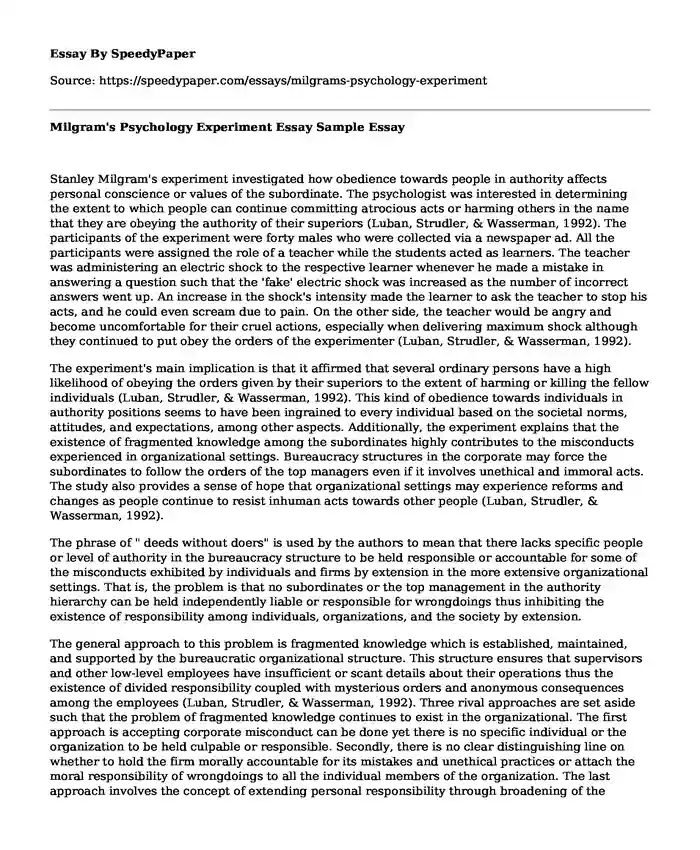
| Type of paper: | Course work |
| Categories: | Psychology |
| Pages: | 3 |
| Wordcount: | 592 words |
Stanley Milgram's experiment investigated how obedience towards people in authority affects personal conscience or values of the subordinate. The psychologist was interested in determining the extent to which people can continue committing atrocious acts or harming others in the name that they are obeying the authority of their superiors (Luban, Strudler, & Wasserman, 1992). The participants of the experiment were forty males who were collected via a newspaper ad. All the participants were assigned the role of a teacher while the students acted as learners. The teacher was administering an electric shock to the respective learner whenever he made a mistake in answering a question such that the 'fake' electric shock was increased as the number of incorrect answers went up. An increase in the shock's intensity made the learner to ask the teacher to stop his acts, and he could even scream due to pain. On the other side, the teacher would be angry and become uncomfortable for their cruel actions, especially when delivering maximum shock although they continued to put obey the orders of the experimenter (Luban, Strudler, & Wasserman, 1992).
The experiment's main implication is that it affirmed that several ordinary persons have a high likelihood of obeying the orders given by their superiors to the extent of harming or killing the fellow individuals (Luban, Strudler, & Wasserman, 1992). This kind of obedience towards individuals in authority positions seems to have been ingrained to every individual based on the societal norms, attitudes, and expectations, among other aspects. Additionally, the experiment explains that the existence of fragmented knowledge among the subordinates highly contributes to the misconducts experienced in organizational settings. Bureaucracy structures in the corporate may force the subordinates to follow the orders of the top managers even if it involves unethical and immoral acts. The study also provides a sense of hope that organizational settings may experience reforms and changes as people continue to resist inhuman acts towards other people (Luban, Strudler, & Wasserman, 1992).
The phrase of " deeds without doers" is used by the authors to mean that there lacks specific people or level of authority in the bureaucracy structure to be held responsible or accountable for some of the misconducts exhibited by individuals and firms by extension in the more extensive organizational settings. That is, the problem is that no subordinates or the top management in the authority hierarchy can be held independently liable or responsible for wrongdoings thus inhibiting the existence of responsibility among individuals, organizations, and the society by extension.
The general approach to this problem is fragmented knowledge which is established, maintained, and supported by the bureaucratic organizational structure. This structure ensures that supervisors and other low-level employees have insufficient or scant details about their operations thus the existence of divided responsibility coupled with mysterious orders and anonymous consequences among the employees (Luban, Strudler, & Wasserman, 1992). Three rival approaches are set aside such that the problem of fragmented knowledge continues to exist in the organizational. The first approach is accepting corporate misconduct can be done yet there is no specific individual or the organization to be held culpable or responsible. Secondly, there is no clear distinguishing line on whether to hold the firm morally accountable for its mistakes and unethical practices or attach the moral responsibility of wrongdoings to all the individual members of the organization. The last approach involves the concept of extending personal responsibility through broadening of the principles that define culpable ignorance (Luban, Strudler, & Wasserman, 1992).
Reference
Luban, D., Strudler, A., & Wasserman, D. (1992). Moral responsibility in the age of bureaucracy. Michigan Law Review, 90(8), 2348-2392.
Cite this page
Milgram's Psychology Experiment Essay Sample. (2022, Nov 08). Retrieved from https://speedypaper.com/essays/milgrams-psychology-experiment
Request Removal
If you are the original author of this essay and no longer wish to have it published on the SpeedyPaper website, please click below to request its removal:
- Essay Example on Rapid Developments in Automation and Robotics
- Letter of Intent Examples
- Gender Roles In Society Essay Sample
- Essay Example with the Response to an Article on the Negative Impacts of the Internet
- Can God Give People a Hell Sentence? Free Essay on Religion
- Law Essay Example: Compare UK Courts and DIFC Courts
- The Van Cortlandt Park, Tourism Essay Example for Students
Popular categories




